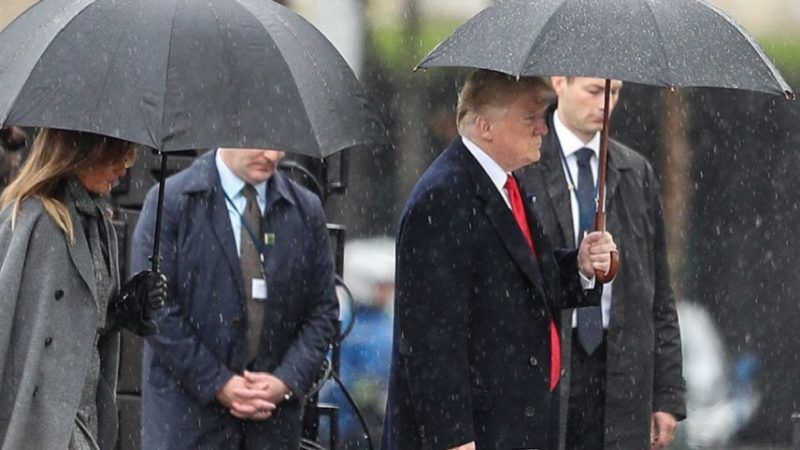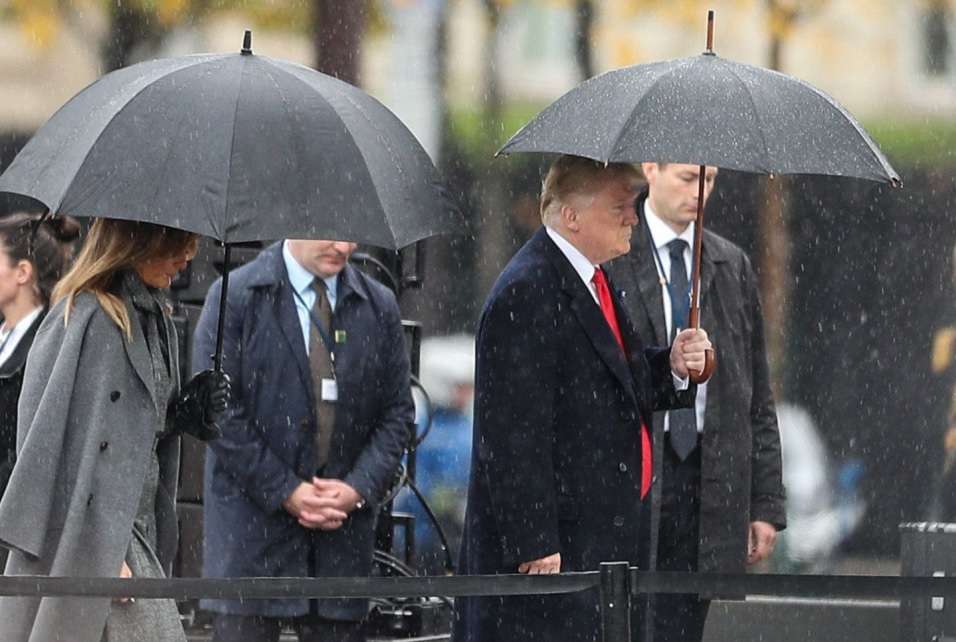Instead of Making Today About Trump, Let's Remember the Dead of World War I
"If any question why we died/Tell them, because our fathers lied," wrote Rudyard Kipling of the Great War. Think about that, not contemporary politics.


Anyone expecting the midterm elections to lance the boil of ultra-banal media coverage of Donald Trump's presidency has got to be disappointed. Less than a week after the Democrats picked up control of the House of Representatives and a bunch of state legislatures and governor's mansions, the media and politicians seem laser-focused on the small stuff, like whether CNN's Jim Acosta manhandled a White House intern during a press conference.
President Trump is deeply complicit in this, of course. His primary method of operation is to keep all eyes glued on him, no matter what. Thus, the 100th anniversary of the end of World War I is now mostly being discussed in terms of Trump's unwillingness to venture out into the rain to pay his respects. Here's a representative tweet, from a British member of Parliament:
They died with their face to the foe and that pathetic inadequate @realDonaldTrump couldn't even defy the weather to pay his respects to The Fallen #hesnotfittorepresenthisgreatcountry
— Nicholas Soames (@NSoames) November 10, 2018
John Kerry, a former Secretary of State, United States senator, presidential candidate, and wounded Vietnam vet, got his digs in as well:
President @realDonaldTrump a no-show because of raindrops? Those veterans the president didn't bother to honor fought in the rain, in the mud, in the snow - & many died in trenches for the cause of freedom. Rain didn't stop them & it shouldn't have stopped an American president.
— John Kerry (@JohnKerry) November 11, 2018
For what it's worth, The New York Post reports that the president did in fact go outside today, to a different cemetery, and in the rain, though bitching about it.
At his final stop in Paris, President Trump sucked it up and got soaked — but didn't seem happy about it.
A day after Trump was criticized for skipping a trip to an American cemetery due to inclement weather, the president spoke at a different US cemetery in the rain, and expressed jealousy that some of the veterans in the audience were seated under cover.
"You look so comfortable up there. Under shelter. As we're getting drenched," Trump told a World War II vet. "You're really smart people."
Here's an alternative way to think about the end of World War I, a terrible, stupid war made more terrible and stupid by America's late-breaking participation. Focus on the number of people who died instead:
The total number of military and civilian casualties in World War I was about 40 million: estimates range from 15 to 19 million deaths and about 23 million wounded military personnel, ranking it among the deadliest conflicts in human history.
The total number of deaths includes from 9 to 11 million military personnel. The civilian death toll was about 8 million, including about 6 million due to war-related famine and disease. The Triple Entente (also known as the Allies) lost about 6 million military personnel while the Central Powers lost about 4 million. At least 2 million died from diseases and 6 million went missing, presumed dead. This article lists the casualties of the belligerent powers based on official published sources. About two-thirds of military deaths in World War I were in battle, unlike the conflicts that took place in the 19th century when the majority of deaths were due to disease. Nevertheless, disease, including the 1918 flu pandemic and deaths while held as prisoners of war, still caused about one third of total military deaths for all belligerents.
And take some time to read Rudyard Kipling's "Epitaphs of the War," penned between 1914 and 1918. Kipling, who carries a whole hell of a lot of baggage of his own, was originally in favor of the war and helped his son get a commission despite eyesight so poor it was disqualifying. His son was killed, the body never recovered. Kipling wasn't a pacifist by any stretch and he didn't necessarily think World War I was avoidable so much as insanely and incompetently prosecuted. Whatever his thinking, he penned lines that still burn with anger and resentment, including these:
If any question why we died,
Tell them, because our fathers lied.
Every leader should read "Epitaphs" before considering military action.
We'd all do a little better using historical commemorations for a moment of reflection instead of advancing the latest partisan outrage.


Show Comments (118)